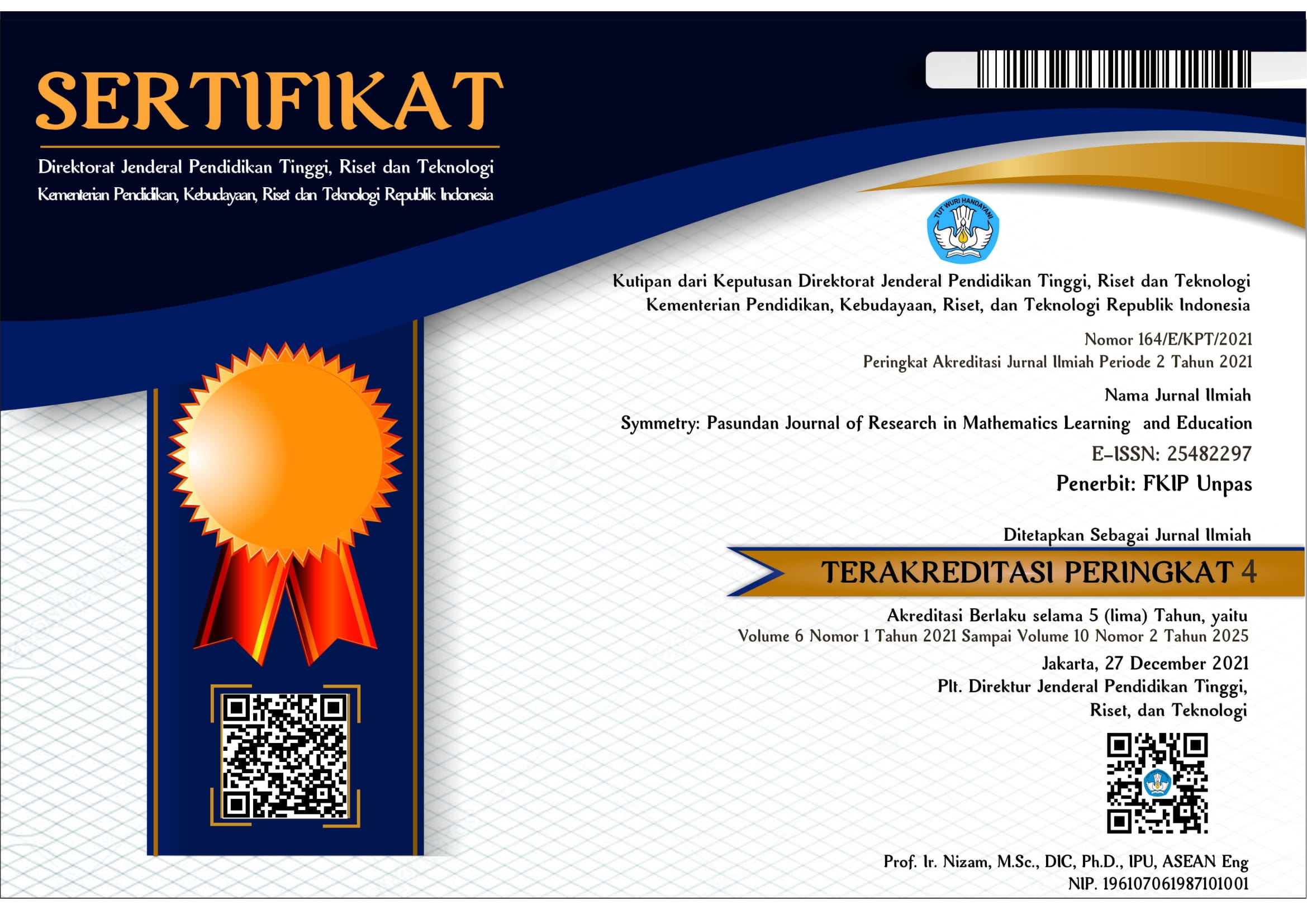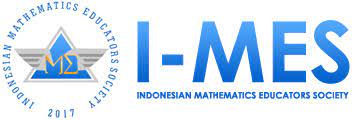IMPLEMENTATION OF HYPOTHETICAL LEARNING TRAJECTORY BASED ON REALISTIC MATHEMATIC EDUCATION ON STUDENTS' CONCEPTUAL UNDERSTANDING
DOI:
https://doi.org/10.23969/symmetry.v9i2.20952Abstract
Good learning design is a learning design that is adjusted to the needs of students in order to achieve the learning objectives that have been set. This study aims to analyze students' understanding of mathematical concepts in Realistic Mathematic Education learning with students who do not apply hypothetical learning trajectory to trigonometric comparison material. Quantitative research method with phonomology design. The subjects of this study were 28 students of class X IPA at SMA 1 Boyolali. The data and data sources in this study consisted of the results of observations of test answers, and interview results. Data collection techniques from written test results (diagnostic tests), interviews and observations. The results of the study obtained the results of the Mann-Whitney test on the post-test value data showed a significance value of 0.000 on students' conceptual understanding. This significance value is smaller than the significance level of α = 0.05 so that there is a significant difference in the average value of conceptual understanding between the experimental and control classes. So it can be concluded that students in the experimental class who were given mathematics learning treatment using RME-based HLT had a better conceptual understanding than students in the control class who were not given treatment.
Downloads
References
Abdullah, W., Halim, A., & Ali, R. F. (2023). the Influence of Blended Learning on Learning Outcomes. Gahwa, 2(1), 51–66.
Amalia, L., Makmuri, M., & Hakim, L. El. (2024). Learning Design: To Improve Mathematical Problem-Solving Skills Using a Contextual Approach. JIIP - Jurnal Ilmiah Ilmu Pendidikan, 7(3), 2353–2366. https://doi.org/10.54371/jiip.v7i3.3455
Arifin, Z., Mulyana, R. B., Sutresna, N., Subarjah, H., Sawali, L., Pratama, K. W., Sonjaya, A. R., Ali, S. K. S., Hasan, S. N., Hasan, S. N., Mustapha, A., Razali, M. N., Sutapa, P., Karakauki, M., & Hardianto, D. (2024). The effect of modification of movement in training on students’ swimming competence. Retos, 51, 949–954. https://doi.org/10.47197/RETOS.V51.101338
Ariyanto, L., Rahmawati, N. D., & Haris, A. (2020). Pengembangan Mobile Learning Game Berbasis Pendekatan Kontekstual Terhadap Pemahaman Konsep Matematis Siswa. JIPMat: Jurnal Ilmiah Pendidikan Matematika, 5(1), 36–48. https://doi.org/10.26877/jipmat.v5i1.5478
Arizona, A., Nurlela, N., & Jannati, Z. (2019). Relaxation technique within group counseling to reduce student’s anxiety on facing exam. Islamic Guidance and Counseling Journal, 2(1), 33–39. https://doi.org/10.25217/igcj.v2i1.310
Batubara, I. H. (2017). Peningkatan Kemampuan Pemahaman Konsep Matematis Melalui Model Pembelajaran Berbasis Masalah Berbantuan Autograph Dan Geogebra Di Sma Freemethodist Medan. MES: Journal of Mathematics Education and Science, 3(1), 47–54.
Darmawan, I. P. A., Octavianus, S., Ratri, W. S., Lesmi, K., Kiswara, Y. E., Souisa, L., Tauran, S. F., Uktolseja, L. J., Pudjiastuti, S. R., & Solikin, A. (2023). Metode Penelitian Pendidikan Praktis. In Widiana Bhakti Persada Bandung.
Dziuban, C., Graham, C. R., Moskal, P. D., Norberg, A., & Sicilia, N. (2018). Blended learning: the new normal and emerging technologies. International Journal of Educational Technology in Higher Education, 15(1), 1–16. https://doi.org/10.1186/s41239-017-0087-5
Erlina, D. A., & Sutarni, S. (2024). Peningkatan Aktivitas Belajar Siswa Melalui Pembelajaran Realistic Mathematics Education (RME). Jurnal Cendekia : Jurnal Pendidikan Matematika, 8(1), 454–463. https://doi.org/10.31004/cendekia.v8i1.2409
Fahrudin, A. G., Zuliana, E., & Bintoro, H. S. (2018). Peningkatan Pemahaman Konsep Matematika melalui Realistic Mathematic Education Berbantu Alat Peraga Bongpas. ANARGYA: Jurnal Ilmiah Pendidikan Matematika, 1(1), 14–20. https://doi.org/10.24176/anargya.v1i1.2280
Fatkhurohmah, Susiyani, R., Kusyuliarto, Murtiyasa, B., & Setyaningsih, N. (2024). Peningkatan Pemahaman Konsep Matematika Materi Statistika Melalui Model Pembelajaran Kooperatif (NHT) di SDN Sampangan. Jurnal Pendidikan: Kajian Dan Implementasi, 6(2), 190–200.
Fuadiah, N. F. (2017). H Ypothetical L Earning T Rajectory Pada Pembelajaran Bilangan H Ypothetical L Earning T Rajectory of Negative Numbers Based on Theory of. Mosharafa, 6(1), 13–24. http://e-mosharafa.org/index.php/mosharafa
Gee, E. (2019). Kemampuan Pemecahan Masalah Matematika Melalui Alur Belajar Berbasis Realistic Mathematics Education (Rme). Jurnal Education and Development, 7(3), 269–277.
Hendrik, A. I., Ekowati, C. K., & Samo, D. D. (2020). Kajian Hypothetical Learning Trajectories dalam Pembelajaran Matematika di Tingkat SMP. Fraktal: Jurnal Matematika Dan Pendidikan Matematika, 1(1), 1–11. https://doi.org/10.35508/fractal.v1i1.2683
Indrapangastuti, D., Surjono, H. D., Sugiman, & Yanto, B. E. (2021). Effectiveness of the Blended Learning Model to Improve Students Achievement of Mathematical Concepts. Journal of Education and E-Learning Research, 8(4), 423–430. https://doi.org/10.20448/journal.509.2021.84.423.430
Isnawan, M. G., & Wicaksono, A. B. (2018). Model Desain Pembelajaran Matematika. Indonesian Journal of Mathematics Education, 1(1), 47. https://doi.org/10.31002/ijome.v1i1.935
Johar, R., Zubainur, C. M., Khairunnisak, C., & Zubaidah, T. (2021). Membangun Kelas yang Demokratis Melalui Pendidikan Matematika Realistik. Syiah Kuala University Press.
Kurniawaty, R., Makmuri, M., & Meiliasari, M. (2023). Pengembangan Pembelajaran Dengan Pendekatan Pmri Untuk Meningkatkan Kemampuan Literasi Matematis Berbudaya Lokal Jakarta. Symmetry: Pasundan Journal of Research in Mathematics Learning and Education, 8(2), 195–204. https://doi.org/10.23969/symmetry.v8i2.10809
Marmoah, S., & Istiyati, S. (2018). Learning Trajectory to Improve Students ’ Critical Thinking. July 2022.
Nikitina, M. A., & Chernukha, I. M. (2022). Methods for Nonparametric Statistics in Scientific Research. Overview. Part 2. Theory and Practice of Meat Processing, 7(1), 42–57. https://doi.org/10.21323/2414-438X-2022-7-1-42-57
Nuraida, I., & Amam, A. (2019). Hypothetical Learning Trajectory in Realistic Mathematics Education To Improve the Mathematical Communication of Junior High School Students. Infinity Journal, 8(2), 247–258. https://doi.org/10.22460/infinity.v8i2.p247-258
Nuriyah, K., M, A. H. A. R., Thohir, P. F. D. M., Rusdiah, N., & Sari, K. W. (2024). Adaptasi Strategi Pembelajaran Responsif terhadap Dinamika Siswa. Jurnal Basicedu, 8(5), 3843–3851. https://doi.org/10.31004/basicedu.v8i5.8674
Pujiastuti, H., & Haryadi, R. (2023). Enhancing mathematical literacy ability through guided inquiry learning with augmented reality. Journal of Education and E-Learning Research, 10(1), 43–50. https://doi.org/10.20448/jeelr.v10i1.4338
Qondias, D., Lasmawan, W., Dantes, N., & Arnyana, I. B. P. (2022). Effectiveness of Multicultural Problem-Based Learning Models in Improving Social Attitudes and Critical Thinking Skills of Elementary School Students in Thematic Instruction. Journal of Education and E-Learning Research, 9(2), 62–70. https://doi.org/10.20448/JEELR.V9I2.3812
Rezky, R., & Wijaya, A. (2018). Designing hypothetical learning trajectory based on van hiele theory: A case of geometry. Journal of Physics: Conference Series, 1097(1). https://doi.org/10.1088/1742-6596/1097/1/012129
Schaathun, H. G. (2022). On Understanding in Mathematics. Teaching Mathematics and Its Applications, 41(4), 318–328. https://doi.org/10.1093/teamat/hrac016
Simon, M. A., Tzur, R., Heinz, K., & Kinzel, M. (2004). Explicating a mechanism for conceptual learning: Elaborating the construct of reflective abstraction. Journal for Research in Mathematics Education, 35(5), 305–329. https://doi.org/10.2307/30034818
Surjono, H. D., Muhtadi, A., & Wahyuningsih, D. (2017). The Implementation of Blended Learning in Multimedia Courses for Undergraduate Students in Indonesia. International Journal of Information and Education Technology, 7(10), 783–786. https://doi.org/10.18178/ijiet.2017.7.10.972
Sutarni, S., & Aryuana, A. (2023). Realistic Mathematics Education (RME): Implementation of Learning Models for Improving HOTS-Oriented Mathematics Problem-Solving Ability. AL-ISHLAH: Jurnal Pendidikan, 15(2), 1213–1223. https://doi.org/10.35445/alishlah.v15i2.2127
Suwarto, S., & Purnami, A. S. (2018). Upaya Meningkatkan Pemahaman Konsep Matematika Melalui Hypothetical Learning Trajectory Pada Materi Vektor. IndoMath: Indonesia Mathematics Education, 1(2), 69. https://doi.org/10.30738/indomath.v1i2.2614
Wandanu, R. H., & Wandanu, Abdul Mujib, F. (2020). Hypothetical Learning Trajectory al Learning Tr jectory Berbasis Pendidikan Matematika Realistik Untuk Mengembangkan Kemampuan Pemecahan Masalah Matematis Siswa. 3(2), 8–16.
Yesi Gusmania, N. A. (2020). Analisis Kemampuan Pemahaman Konsep Matematis Mahasiswa Pada Mata Kuliah Kalkulus Ii. PHI: Jurnal Pendidikan Matematika, 4(2), 85. https://doi.org/10.33087/phi.v4i2.104
Yudhani, A. S. (n.d.). Eksplorasi Strategi Belajar Siswa Berprestasi Dalam Pembelajaran Matematika Siswa SD Eksplorasi Strategi Belajar Siswa Berprestasi Dalam Pembelajaran Matematika Siswa SD. 4(2), 1535–1545.
Downloads
Published
Issue
Section
License
Copyright (c) 2024 Symmetry: Pasundan Journal of Research in Mathematics Learning and Education

This work is licensed under a Creative Commons Attribution 4.0 International License.
Hak Cipta sepenuhnya ditangan jurnal.



















